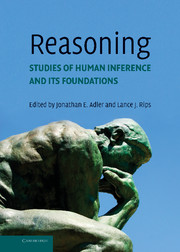18 - When Explanations Compete: The Role of Explanatory Coherence on Judgments of Likelihood
Published online by Cambridge University Press: 05 June 2012
Summary
Introduction
One way to decide whether a proposition is likely to be true is by considering why it might be true. We generate explanations and evaluate their plausibility. If the only available means of evaluating our explanations is in turn to explain them, then we are in danger of an infinite regress which leaves us uncertain as to the truth of the original proposition. But often some other means is available. We can evaluate our explanations by appealing to logic, authority, general knowledge or episodic memory. For example, to establish belief in the proposition
(A) Experienced car mechanics earn in the top quartile of incomes in the United States.
we might generate the explanation that they charge exorbitant and unnecessary labor costs which we can confirm from our own experience. This would increase the subjective likelihood of the proposition.
In the case of inductive inference, where we're deciding whether a proposition (a conclusion) is likely on the basis of knowledge that one or more related propositions (premises) are true, we must often consider not only why the conclusion might hold, but also why the premises do hold, and, most importantly, what implications our explanation for the premises has for the conclusion. One context in which this occurs is when we're reasoning by analogy. For example, consider the proposition concerning car mechanics above given the new information that
(B) Experienced electricians tend to earn in the top quartile of incomes in the United States.
A reasonable strategy would be to try to explain why both electricians and car mechanics would be in such income brackets and then decide whether the explanation for electricians is relevant to car mechanics.
Information
- Type
- Chapter
- Information
- ReasoningStudies of Human Inference and its Foundations, pp. 343 - 352Publisher: Cambridge University PressPrint publication year: 2008
